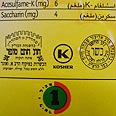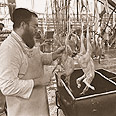
Kosher
Photo: Gabi Menashe

Kosher factory
Photo: GPO
Anyone who's been to Jewish population centers has probably enjoyed kosher hot dogs, kosher falafel, or kosher delicatessen. So what's behind all this delicious food? The Hebrew word "kosher" literally means "prepared." Foods that are permitted by the Torah and prepared according to Jewish law are kosher.
Fish: The Torah (Leviticus 11:9) teaches that a kosher fish must possess both fins and scales. Even if the fish has only one scale or one fin, it is permitted. Tuna, for example, have very few scales, yet is kosher. Other popular kosher fish are bass, carp, cod, flounder, halibut, herring, mackerel, trout and salmon. Crustaceans (such as lobster and crab) and other shellfish are not kosher, because they lack scales. Further, all mammals are not kosher.
One must wait up to six hours after eating meat products before eating dairy products. However, meat may be eaten following dairy products (with the exception of hard cheese, which also requires a six-hour interval). Prior to eating meat after dairy, one must eat a solid food and the mouth must be rinsed.
Kosher species
Animals: The Torah (Leviticus 11:3) lists the characteristics of permitted animals as those with fully split hooves, who also chew their cud (ruminants). Kosher animals are always mammals and herbivores. The kosher animals commonly eaten today are the cow, goat and sheep - and sometimes deer and buffalo.
Birds: The Torah enumerates 24 forbidden species of birds, and the Talmud explains that, among other signs, all birds of prey (vulture, hawk, eagle) are forbidden. In practice today, we eat only those birds for which there is an established tradition that the bird is kosher - e.g. chicken, turkey, duck and goose. As for "kosher eggs," they must come from a species of kosher bird.
Troubles
Ynetnews and AP
AgriProcessors Inc., world's largest kosher slaughterhouse, receives grand jury subpoena requesting documents; reason could be either PETA complaints or reports of substandard working conditions
Insects: Many are surprised to discover that four species of grasshoppers are kosher (Leviticus 11:22). However, all other insects are not kosher. One might think that this has little practical application to our modern eating habits. But in truth, many leafy vegetables often contain insects and must be carefully examined before they can be eaten. Some fruits like raspberries and strawberries are also problematic.
Kosher slaughtering
Shechita: Besides being from a kosher species, kosher meat requires that the animal/bird be slaughtered in the manner prescribed by the Torah. In this procedure, a trained kosher slaughterer severs the trachea and esophagus of the animal with a special razor-sharp knife. This also severs the jugular vein, causing instantaneous death with no pain to the animal.
Bedika: After the animal/bird has been properly slaughtered, its internal organs are inspected for any physiological abnormalities that may render the animal non-kosher. The lungs, in particular, must be examined to determine that there are no adhesions which may be indicative of a puncture in the lungs.
Nikkur: Animals contain many veins and fats that are forbidden by the Torah and must be removed. The procedure of removal is called "Nikkur," and it is quite complex. In practice today, the hind quarter of most kosher animals is simply removed and sold as non-kosher meat.
Salting: The Torah forbids eating of the blood of an animal or bird (Leviticus 7:26); fish do not have this requirement. Thus in order to extract the blood, the entire surface of meat must be covered with coarse salt. It is then left for an hour on an inclined or perforated surface to allow the blood to flow down freely. The meat is then thoroughly washed to remove all salt. Meat must be koshered within 72 hours after slaughter so as not to permit the blood to congeal.
Additional prohibitions
Meat and Milk: The Torah forbids eating meat and milk in combination, and even forbids the act of cooking them together. As a safeguard, the Sages disallow the eating of meat and dairy products at the same meal, or preparing them with the same utensils. Therefore, a kosher kitchen must have two separate sets of pots, pans, plates and silverware - one for meat/poultry and the other for dairy foods.
Campaign
Ynetnews
New York Times reports: Leading marketer of kosher foods about to launch its first campaign aimed at general market
Limb of Live Animal: The Torah (Deut. 12:23) prohibits eating a limb that was removed from an animal before it was killed.
Chalav Yisrael: A Rabbinic law requires that there be supervision during the milking process to ensure that the milk comes from a kosher animal. In the United States, many people rely on the Department of Agriculture's regulations and controls as sufficiently stringent to fulfill the rabbinic requirement for supervision. Many people, however, do not rely on this, and will only eat dairy products that are designated as Chalav Yisrael (literally, "Jewish milk").
Bishul Akum: Bishul Akum is a Hebrew term meaning, "cooked by a non-Jew." As a rabbinic safeguard against assimilation, certain foods cooked by a non-Jew are considered not kosher. The basic rule is that any cooked food which: could not have been eaten raw, and is important enough to be served at a fancy meal table, may not be eaten if cooked by a non-Jew. If a Jew assists with lighting the fire or the cooking, the food may be eaten even if it was cooked by a non-Jew.
Why keep kosher?
Spirituality: The Torah teaches that non-kosher food has a negative effect on a Jewish soul. The soul is like an antenna that picks up waves of spiritual energy. Eating non-kosher food damages the capacity of the soul to "connect spiritually." This damage can be repaired once a person starts eating kosher again.
Self Growth: If a person can be disciplined in what and when he eats, it follows that he can be disciplined in other areas of life as well. Kashrut requires that one must wait between milk and meat, and we may not eat certain animals or combinations of foods. All of this instills self-discipline, and enables us to elevate our spiritual side, by making conscious choices over animal urges.
Health Reasons: With its extra supervision, kosher food is perceived as being healthier and cleaner. After slaughter, animals are checked for abscesses in their lungs or other health problems. Blood - a medium for the growth of bacteria - is drained. Shellfish, mollusks, lobsters and crabs have spread typhoid and are a source for urticara (a neurotic skin affliction). Milk and meat digest at an unequal rate and are difficult for the body. And of course, pigs can carry trichinosis.
Moral Lessons: We are taught not to be cruel - even to animals. A mother and her young are forbidden to be slaughtered on the same day, and of course we "don't boil a kid (goat) in its mother's milk." We must not remove the limb of an animal while it is still alive (a common practice, prior to refrigeration). When we slaughter an animal, it must be done with the least possible pain. And we are reminded not to be vicious, by the prohibition to eat vicious birds of prey.
Tradition: One of the keys to making a Jewish home "Jewish" is the observance of keeping kosher. When we keep kosher in the home, our attachment to Judaism and the sacrifices that we make become ingrained on our children's minds forever. And with food so often the focus of social events, keeping kosher provides a built-in hedge against assimilation. For many, the bridge between past and future is the spiritual aroma of a kosher kitchen.
Reprinted with permission of Aish















